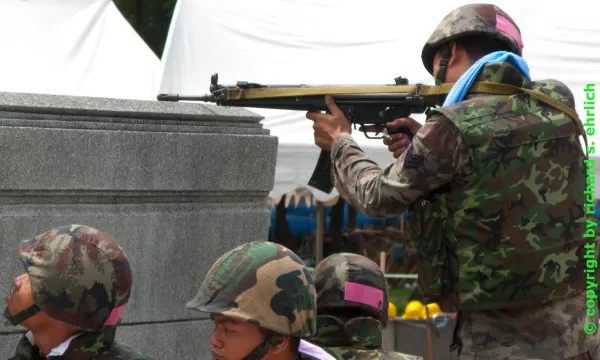BANGKOK, Thailand -- The army's new commander-in-chief in a veiled
threat warned he may unleash a coup if people "create riots" against
the results of next February's promised elections.
The polls are expected to won by the current putsch-installed military
regime's allies but a surprise victory could be achieved by their
civilian enemies.
Army Commander-in-Chief Gen. Apirat Kongsompong's remarks coincided
with the first visit to Thailand by Admiral Phil Davidson, Commander
of the U.S. Indo-Pacific Command (INDOPACOM).
The U.S. commander's October 16-17 meetings included 2014 coup leader
Prime Minister Prayuth Chan-ocha, his powerful Defense Minister Prawit
Wongsuwan, and newly appointed Supreme Commander Gen. Ponpipaat
Benyasri.
"The U.S. remains committed, as a long-time friend and ally, to
working with Thailand in advancing regional security and prosperity,"
Adm. Davidson said.
Asked during a news conference if the highly politicized U.S.-trained
army which was placed under Gen. Apirat's command on October 1 would
seize power if the junta's civilian opponents achieved an unexpected
victory in February, Gen. Apirat replied:
"If politics does not create riots, nothing will happen. There have
been more than 10 military coups in the past, but previous ones were
the result of political unrest."
The military's most 2014 coup came after pro-military protesters
opposed an elected civilian government, blocked people from voting for
a fresh administration, and called on the army to restore order in
Bangkok's bloodied streets.
Gen. Apirat reportedly led a major military unit, the 1st Division of
the King's Guard, during the 2014 coup.
He is the son of a 1991 coup leader, then-Supreme Commander Gen.
Sunthorn Kongsompong, who was educated in the U.S. Army Infantry
School at Fort Benning and the U.S. Army Command and General Staff at
Fort Leavenworth and who easily ousted a corrupt civilian government.
Gen. Apirat is also secretary-general of the junta's ruling body known
as the National Council for Peace and Order, and he commands its
Peacekeeping Force which controls the army, navy, air force and
police.
Gen. Apirat's warning on October 17 spread fear among Thai
politicians, analysts and media who predicted if pro-democracy groups
win against the odds and form a government after February's elections,
their fragile administration could quickly be toppled, clamping this
U.S. ally back under suffocating military control.
"There have been no signs of potentially serious conflicts or unrest,"
the less powerful Gen. Pornpipat said, hoping to dampen anxiety about
Thailand's stability amid efforts to attract international investment,
tourists and respect.
"Let us not jump the gun about incidents that have not happened, or
are unlikely to occur, and make people worried," Gen. Pornpipat said.
"What the army chief means is that if the country stays peaceful,
there is nothing to worry about. So everything depends on the
situation," echoed Defense Minister Prawit on October 18.
The military's earlier 2006 coup toppled then-Prime Minister Thaksin
Shinawatra before the 2014 putsch ended the administration of Mr.
Thaksin's sister, former prime minister Yingluck Shinawatra.
Today, the wealthy siblings are barred from politics and are
international fugitives dodging prison sentences after each was
convicted of separate financial-related crimes committed during their
time in office.
It is unclear if Mr. Thaksin's political candidates will be able to
win enough seats in the tentatively scheduled February election for
parliament's 500 House of Representatives or if they plan to punish
the junta's generals with possible dismissal or worse, analysts said.
"I think the pro-democracy parties, all together, would win more than
300 [House] seats out of 500," Mr. Thaksin told Japan's Kyodo News in
Hong Kong on October 18.
Those parties include the Pheu Thai ("For Thais"), Pheu Chart ("For
the Nation"), and Pheu Tham ("For Buddhist Law").
Many analysts predict Prime Minister Prayuth will extend his rule
after the polls either as a winning candidate or appointed by
parliament.
To be appointed as an unelected prime minister, Mr. Prayuth would need
support from 375 parliament members out of a total 750.
Mr. Prayuth already orchestrated a recently enacted constitution
allowing those 750 to include a 250-seat Senate to be appointed by his
junta.
That makes it possible for him to come back as prime minister
installed by that 250 block vote plus 125 among the 500 elected House
members.
If a new civilian government does win, the army chief's warning may
inhibit their ability to maneuver.
Some pro-democracy candidates vow to amend the constitution, strip the
military's political power, and shred the junta's edicts against free
speech and other basic rights.
"Coups d'etat are against the law," said Mr. Thaksin's allied Pheu
Thai party member Watana Muangsook after Gen. Apirat made his veiled
threat.
"I believe Gen. Prayuth...had to make a sacrifice," when he staged the
2014 coup and restored order, Gen. Apirat said.
"He is my role model," Gen. Apirat said.
"The newly appointed army chief has already laid the foundations for a
siege of the country's future democracy," the Bangkok Post responded
in an editorial on October 20.
"His remark, in fact, makes the country increasingly vulnerable to
another coup because it sets a condition for it.
"Anyone who wants to overthrow an elected government can just organize
a rally and stir up mayhem, using it as a pretext for military
intervention," it said.



